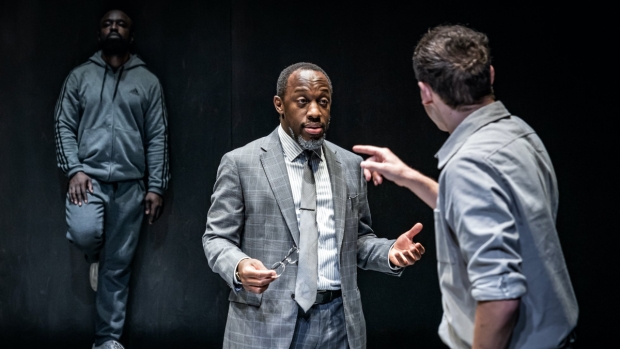Blue/Orange review – Joe Penhall's topical masterpiece feels as critically relevant as ever
The production opened in Bath, ahead of stops in Oxford and Northampton

© Marc Brenner
The great plays can be identified by their relevance to all ages and times. 20 years after its original premiere, Joe Penhall's Blue/Orange may not have fully staked its claim just yet, but its core themes of mental health support, racial inequality, chronic underfunding in the NHS, and academic one-upmanship still feel as pertinent today as it ever did.
The battle for the well-being of Christopher, currently sectioned in a psychiatric unit but coming to the end of his 28 days and with nowhere to go is at the heart of Penhall's always fascinating ideas play. Though Christopher believes oranges are the colour blue and that Idi Amin is his father, that he can sometimes hear voices, and has moments of explosive anger, senior consultant Robert believes he is fit to be released back into the community. After all, there are no spare beds and new patients to see. Junior doctor Bruce opposes this and thus a battle over moral and medical issues is raised.
What Penhall crafts expertly is all the sides of an impossible-to-win argument. Bruce is a young idealist, who, originally at least seems to have his patients' needs at the top of his priority list but is prone to be too open in his dealings with others, prone to lashing out when hurt, and just as nakedly ambitious as his older mentor. The biggest change in this revival, directed with strong clarity by James Dacre, is making Robert a black man. Originally played with strong loquaciousness by Bill Nighy, Giles Terera's elegant, slightly world-weary consultant lets us see the characters' process from a different perspective. His book on curing black schizophrenia no longer feels like a weaponizing of race for personal gain, but a much deeper and personal lifetime of work. He is still prone to making patients a case study rather than viewing them as individuals, but it feels more than just career progression with him. The arrogance and belittling of others are still very much a part of him but there are personal stakes here too. Ralph Davis as the young doctor feels like he is on slightly sticky ground when it comes to the discussion of race.
The performance of the night comes from Michael Balogun's Christopher. Affable one moment coiled the next, his eyes reveal the terror of a man with no place to belong and in need of a place in the community. Penhall's play leaves us in doubt who is the victim ultimately of these medical arguments, even if there is a late reveal that makes everything thornier. Balogun, who is having a real rise through the ranks after taking over from Terera in the National's Death of England (next Benedick in the RSC'S Much Ado About Anything) is the kind of actor that makes it impossible to look away. There is a real naked openness and truth to a man who is being spat out of a system, financially unable to support him There are never easy arguments the play suggests, but compassion for those that need it most is surely at the heart.
Dacre paces it into thriller-like territory- the music of Valgeir Sigurosson is arguably a little too on the nose with this- and the 130-minute run time builds up in emotional intensity. Its second half arguably circles not builds on its arguments but by then Penhall has made us care. Sadly, you can see that its 50th-anniversary production will feel just as relevant.












